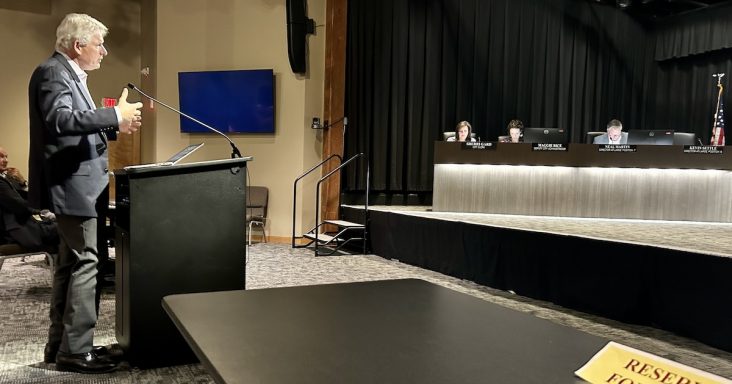Attorney: ’Significant’ plan needed for Fort Smith to receive consent decree extension
by August 27, 2024 10:26 pm 578 views

Paul Calamita, an attorney with Richmond, Va.-based AquaLaw, addresses the Fort Smith Board of Directors on Tuesday (Aug. 27) about the city’s federal consent decree.
The City of Fort Smith has a tall task in front of it to convince federal agencies to give the city relief on a consent decree mandating sewer system work. Detailed financial plans, system work schedules, and rate increases are just part of that tall task, according to Paul Calamita.
Calamita, an attorney with Richmond, Va.-based AquaLaw, and consultant to the city with the consent decree effort, told the Fort Smith Board of Directors on Tuesday (Aug. 27) that without a solid plan “we might find ourselves with the agencies in front of Judge Holmes in the next couple of months.” Holmes is U.S. District Judge P.K. Holmes III, who is part of the oversight in ensuring the city meets consent decree requirements.
After years of failing to maintain water and sewer infrastructure to federal standards, the city entered into a federal consent decree with the U.S. Environmental Protection Agency (EPA) and U.S. Department of Justice (DOJ) in late 2014. The consent decree, which began in January 2015, required the city to make an estimated $480 million worth of sewer upgrades in 12 years.
In May 2022, Fort Smith voters passed a 0.75% sales tax from Jan. 1, 2023, to Dec. 31, 2030, with 83.3% of the revenue going to federal consent decree work on the city’s water and sewer system, and 16.7% directed to the police department. Funding for consent decree work to date also has come in part from water and sewer bill increases, which are up 167% since 2015.
According to the city, the DOJ on Aug. 8 presented a revised financial plan that adds another five years to the previous five-year extension. The proposed revised plan includes customer sewer rate increases up to 19% beginning in 2031.
To be allowed a five-year extension to 2036, Calamita said the city needs to pull forward a “significant” amount of sewer system work and show the federal agencies how it will pay for the work. In addition to finding the money, Calamita said the city will also be challenged to find enough construction companies to do the work. He said with the millions in water system work and possibly up to $1 billion to build the foreign pilot training center at Ebbing Air National Guard Base in Fort Smith, there may not be enough contractors and workforce to expedite sewer system work.
“We’ve exhausted the local contractor capacity,” Calamita said.
Director Christina Catsavis, along with other directors, expressed frustrations about asking residents to pay more to meet the federal requirements. She urged Calamita to stress to federal officials the “good faith effort” the city has taken to fix the system. Calamita said he has been the city’s “biggest cheerleader” with the agencies because Fort Smith has done more than many communities with which he has worked and continues to work on similar mandates. He said he has stressed to the EPA and DOJ that it’s not the city’s fault that costs have ballooned and there aren’t enough contractors.
The board agreed Tuesday to vote in the next regular meeting to allow city administration and Calamita to negotiate with the federal agencies on a consent decree extension. Any agreement will then have to be approved by the board.
Calamita told Talk Business & Politics that it could be up to 90 days after an offer is made before the EPA and DOJ issue a decision. If an agreement is reached, it will then require a 30-day public comment period. After that, it would require approval by Judge Holmes.
